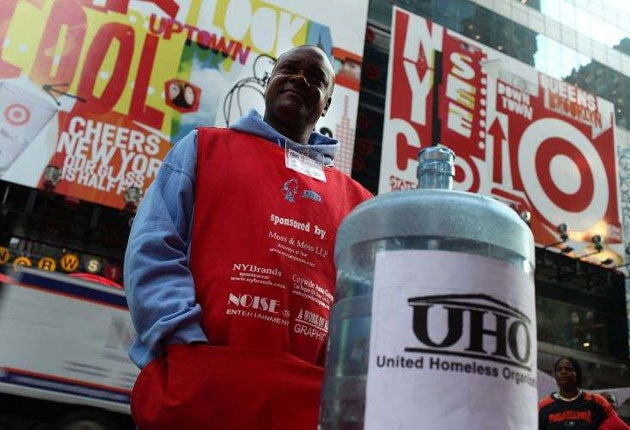Buddy, can you spare a dime – for a scam?
Lawsuit claims US homeless charity simply a sham to line owners' pockets

Your support helps us to tell the story
From reproductive rights to climate change to Big Tech, The Independent is on the ground when the story is developing. Whether it's investigating the financials of Elon Musk's pro-Trump PAC or producing our latest documentary, 'The A Word', which shines a light on the American women fighting for reproductive rights, we know how important it is to parse out the facts from the messaging.
At such a critical moment in US history, we need reporters on the ground. Your donation allows us to keep sending journalists to speak to both sides of the story.
The Independent is trusted by Americans across the entire political spectrum. And unlike many other quality news outlets, we choose not to lock Americans out of our reporting and analysis with paywalls. We believe quality journalism should be available to everyone, paid for by those who can afford it.
Your support makes all the difference.Every cent of loose change helps. For decades that has been the pitch of the United Homeless Organisation (UHO), whose workers operate on dozens of street corners in Manhattan, urging passers-by to help provide food, clothing and hygienic services for the tens of thousands of people in New York without a roof over their heads.
But if the state's top legal officer is to be believed, the charity is nothing but a scam, whose sole beneficiaries are the two people that run it and their workers. In a lawsuit filed this week, Attorney-General Andrew Cuomo claimed their programmes to help the homeless simply do not exist.
Instead, the UHO "exploits the good intentions of people who thought they were helping fund the homeless" to channel money to its principals and workers, who then use the group's non-profit, tax-exempt status "to line their own pockets".
The suit's main targets are Stephen Riley, a former homeless man who runs the UHO out of his apartment near the Bronx zoo, and director Myra Walker. Mr Cuomo says they spent much of the proceeds on personal expenses, including travel, restaurants and shopping, while doing nothing for the homeless.
By the standards of scams in New York, this one is small. The UHO's declared revenues never exceeded $100,000 (£60,000) a year – even though Mr Cuomo said the donations and the fees for Mr Riley and Ms Walker were "grossly under-reported". If Mr Cuomo is right, UHO in practice is no more than a franchise for begging.
Mr Riley set up the body in 1985 and won tax-exempt status in 1993. He now charges workers $15 to $25 (£9 to £15) to rent a table and a jar for a four-hour shift. In return, the lawsuit says, the worker received a tablecloth, a UHO apron, plus an incorporation document from the state of New York, as proof for anyone who asked if it was a legally sanctioned charity. The workers keep everything over the base charge for themselves. Receipts during a shift in peak season can reach $80 (£48), although some workers said they made no more than $10 (£6) for themselves.
Probably because the scheme is relatively small-scale, the state is taking civil rather than criminal action against UHO. The lawsuit seeks a temporary shutdown order, that would lead to permanent closure, and repayment by the two principals of falsely claimed money.
With some 50 tables around Manhattan, each operating for two to three shifts seven days a week, Mr Riley and Ms Walker could have collected well over $100,000 in fees a year, according to some estimates. Yesterday the organisation refused comment on the accusations, and for the second day running its website was down.
Subscribe to Independent Premium to bookmark this article
Want to bookmark your favourite articles and stories to read or reference later? Start your Independent Premium subscription today.
Join our commenting forum
Join thought-provoking conversations, follow other Independent readers and see their replies
Comments